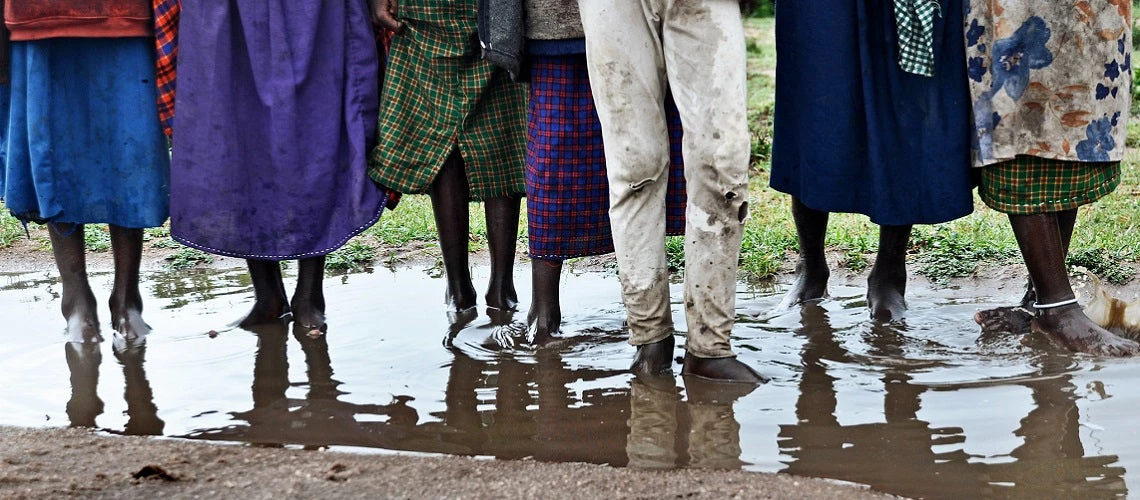 Children line up with their toes in a shallow puddle in Kenya.
Children line up with their toes in a shallow puddle in Kenya.
The COVID-19 pandemic will push up to 150 million people into extreme poverty. Preparedness and response measures have certainly averted even more acute and widespread deprivation, but the crisis is far from over and more action will be needed. In this context, the 2020 World Bank Group-International Monetary Fund Annual Meetings theme, “supporting a resilient recovery,” expresses the Bank Group’s long-term commitment to help governments execute strategies for rapid, sustainable, and inclusive recovery. Looking ahead, however, our capacity to deliver on these commitments will soon be tested by another crisis. New research shows that up to 132 million people will be pushed into extreme poverty by climate change by 2030.
"New research shows that up to 132 million people will be pushed into extreme poverty by climate change by 2030."
Our new study updates previous estimates that without action climate change could push more than 100 million people into extreme poverty by 2030, with these poverty impacts increasing after 2030 until climate policies succeed in reducing global carbon emissions to zero so that climate change can be stabilized. People may understandably focus on the pessimistic outlook of these results. But our study also shows that the impact of climate change on poverty can be halved, if we stay on course with the Sustainable Development Goals adopted by all United Nations Member States in 2015. This is because a more inclusive economy with universal access to water and sanitation, modern energy, health care, and social protection is also a more resilient and robust economy. Our most important finding is that the future impacts are not written in stone.
But what is most urgent varies across regions. In the poorest region, Sub-Saharan Africa, rising food prices due to reduced agricultural yields is expected to be the largest driver of the increase in poverty. Food security is the priority for action because very poor people spend a large share of their budget on food. In Malawi, households spend on average 63% of their income on food and beverages. For such people, even a small increase in the price of food can reduce their ability to meet their needs and throw them into the deepest poverty. Ensuring agricultural production can cope with climate change is essential. But improving global food security also requires ensuring that food goes where it is needed.
In South Asia, home to some of the most vulnerable countries to natural hazards, such as Bangladesh and India, there are three key drivers of poverty: food prices, because of high poverty in the region; health shocks, because of the prevalence of diarrheal diseases; and natural disasters, because of large exposure to cyclones, floods, and other extreme weather events. Better managing natural risks has been a priority of the international community in the last few decades, with amazing progress made in our ability to save lives thanks to weather forecasts and early warning systems. But there are still too many losses from natural disasters, because urban planning and infrastructure construction too often fails to take into account the risks from floods and other extreme events. And when people are affected, losing their home or livelihood to a disaster, they are too often alone and unable to cope with and recover from the shock. Adaptive social protection has a proven record in helping people rebuild their lives after disasters but is still far from universal.
In richer regions, like Latin America or East Asia, households are better able to cope with more expensive food. In Brazil, for example, households spend “only” 23% of their income on food. In those places, health shocks are the main reason why people may fall into poverty because of climate change: this is because even middle-class households can fall immediately into extreme poverty when affected by an illness. In 2013, the World Health Organization estimated that 100 million people are pushed into poverty every year because of health expenditures. Climate change is expected to make the situation worse, making achieving universal access to health care even more important in the future than it is today.
Of course, in 2020 nobody needs to hear that better health care should be a priority. As of October 1, the global COVID-19 pandemic has killed over 1 million and infected some 35 million. Massive investments have been made in emergency response to improve the ability of low- and middle-income countries to manage the current crisis, but a parallel action needs also to prepare for future crises, and this includes the expected climate-related changes in the prevalence and distribution of diseases.
Today, understandably, the world is focused on controlling the pandemic and managing the economic devastation it has caused. There are, however, innumerable synergies between the current needs created by COVID-19 and the urgent needs created by climate change, and we can capture them. The similarity of the estimates of the poverty impact of COVID-19 in 2020 and the impact of climate change by 2030 only highlights the need to fight these two fronts at once.



Join the Conversation